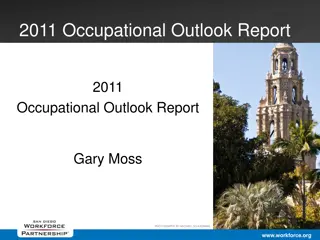Impact of Covid-19 on Indian Businesses: Analysis and Future Outlook
Covid-19 pandemic has severely impacted businesses in India, leading to shutdowns, decreased demand, and layoffs. Small businesses are hit the hardest, struggling to survive amidst reduced customer confidence. The study aims to analyze the most affected sectors and predict the future of Indian businesses post-pandemic, utilizing both qualitative and quantitative research methods.
Download Presentation

Please find below an Image/Link to download the presentation.
The content on the website is provided AS IS for your information and personal use only. It may not be sold, licensed, or shared on other websites without obtaining consent from the author. Download presentation by click this link. If you encounter any issues during the download, it is possible that the publisher has removed the file from their server.
E N D
Presentation Transcript
DEPARTMENT OF MANAGEMENT STUDIES GURU GHASIDAS CENTRAL UNIVERSITY BILASPUR (CHHATTISGARH) NEHA KHILWANI RESEARCH SCHOLAR
The Covid-19 pandemic has had a profound impact on businesses around the world. In India, the lockdown has resulted in a sharp slowdown in economic activity, with businesses across sectors struggling to stay afloat. The situation is particularly dire for small businesses, which make up a large part of the Indian economy. Many small businesses have been forced to shut down due to lack of customers and cash flow. The pandemic has also hit the Indian stock market hard, with the Sensex and Nifty falling by over 20% since the beginning of the year. The World Bank predicted that the Indian economy will contract by 5% in 2020 and have a severe decline in growth to 2.8% in fiscal 2021 in its South Asia Economic Update: Impact of COVID-19 report. The economic impact of the pandemic is expected to be long-lasting, with businesses expected to take years to recover. The global economy is experiencing its steepest decline ever. Nearly every country's growth has been significantly harmed by the corona virus, which is also to blame for the global GDP decline. India is similarly affected by this virus to other nations, however not as severely. Sales and income have decreased in almost every industry sector. India's GDP growth in the third quarter of 2020 was 4.7%.The government has announced a number of measures to help businesses weather the crisis, including a Rs 20 lakh crore stimulus package. However, it remains to be seen how effective these measures will be in mitigating the impact of the pandemic on the Indian economy.
To study the impact of covid 19 on Indian Business. To study the business sectors which are most impacted by covid-19. To study the future of Indian businesses post Covid-19.
The methodology is essential for constructing the analysis work because both qualitative and quantitative methods were included in the investigation. Secondary data, which was needed for this work, was gathered from textual sources such a variety of periodicals, articles, reports, books, journals, and literatures on the subject.
The Covid 19 pandemic has had a significant impact on businesses in India. Many businesses have been forced to shut down, and those that are still operating are struggling to survive. The pandemic has also resulted in a decrease in demand for many products and services. This has had a knock- on effect on businesses, as they are forced to lay off staff or reduce their hours of operation. The pandemic has also caused a decrease in customer confidence, which has further contributed to the decline in business activity. In order to survive, businesses will need to adapt to the new reality of the Covid 19 pandemic. The impact of Covid 19 has been felt particularly hard by small businesses, which often don't have the same resources as larger businesses to weather the storm. The impact of Covid 19 on businesses in India is likely to be long-lasting. Even after the lockdown is lifted, businesses will still be grappling with the effects of the pandemic. It will take time for demand to return to normal levels, and many businesses will struggle to recover. The Covid 19 pandemic is likely to have a lasting impact on the Indian economy, and businesses will need to adapt to survive in the new landscape.
Retail Real State Media and Entertainment Supply Chain Health Care
The COVID-19 pandemic was declared a pandemic by the World Health Organization about two years ago, and now the world is adjusting to the disruptions it has caused. The pandemic's toll on healthcare systems has been the most significant and lasting effect. And then there has been the economic toll, which has been more enduring and resounding. Government initiatives to combat infections and stop the virus's spread resulted in supply shocks, particularly in manufacturing, while lockdowns and other containment measures caused significant business disruption. It is now obvious that the pandemic, which is expected to have long-term structural effects, has caused the globe to experience the second major economic and financial crisis of the twenty-first century. Additionally, it has exposed the weaknesses in the geopolitical and economic order of the world. In fact, our economy is starting to show signs of revival. The International Monetary Fund (IMF) predicts that the Indian economy will grow by 9.5% in 2021, while the world economy will expand by 6%. The adoption of widespread work-from-home policies, as well as the use of cloud services and videoconferencing, is all occurring at the same time that the world experiences exponential expansion in digital services and infrastructure. Many technology companies have highlighted that it would ordinarily take two to three years to make the gains in digitalization that were made in a matter of months. Although there is still more work to be done, these are encouraging signals.
India is an exciting place for entrepreneurs and investors to do business. It is home to one of the fastest growing markets in the world with a rich culture, diverse people and a great diversity of products and services. The country is also well-known for its strong entrepreneurial spirit that has led it to become an economic powerhouse over the past few decades. The COVID-19 pandemic has permanently changed how businesses run all over the world. The pandemic, according to 55% of survey participants, has "resulted in irreversible modifications to our organizational approach." A significantly higher 60 percent claim that COVID-19 has "advanced process automation" and "changed our approach to change management," while 64 percent acknowledge a shift to more cloud-based corporate operations. The corona virus pandemic and its detrimental economic implications made the statement that business's main social responsibility was to maximize profits while abiding by the law. This dictum, which places a sharp emphasis on the short term, has taken a firm hold on much commercial behavior. Business leaders will react to the effects of the corona virus outbreak in this environment.
1.Brende. (2021, November 10). Indias roadmap for success and prosperity in the post-COVID world. World Economic Forum. Retrieved November 5, 2022, from https://www.weforum.org/agenda/2021/11/india-s- future-and-role-in-the-post-covid-19-world/ 2. COVID-19 and the future of business. (2020, September 21). IBM. Retrieved November 5, 2022, from https://www.ibm.com/thought-leadership/institute-business-value/report/covid-19-future-business 3. Misra. (2021, December 10). Coronavirus (COVID-19) Impact on Indian Business and Economy. Compare & Apply Loans & Credit Cards in India- Paisabazaar.com. Retrieved November 5, 2022, from https://www.paisabazaar.com/business-loan/coronavirus-impact-on-indian-business-and-economy/ 4. Tourish. (2020, June 26). The Coronavirus Crisis and Leadership in Business. International Leadership Association. Retrieved November 5, 2022, from https://ilaglobalnetwork.org/the-coronavirus-crisis-and- leadership-in-business/ 5.https://www.researchgate.net/publication/354734267_Impact_of_Covid- 19_on_the_Indian_Economy/link/614a23f7a595d06017e11f58/download 6. https://www.ijcrt.org/papers/IJCRT2006648.pdf 7. https://www.covid19impactreportv2report2017-2030

 undefined
undefined



























